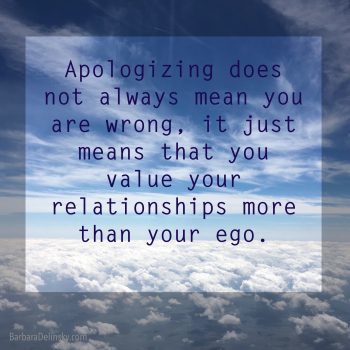
“I’m sorry,” she said in horror.
Embarrassed, she said, “I’m really sorry.”
“I am so, so sorry,” she said with heartfelt regret.
I write these words in my books all the time. In fact, I’m about to write a pivotal scene in Making Up in which apologies are key. It’s between mother and daughter, Margaret and Mackenzie, ages 60 and 38 respectively, and they’ve been estranged for nearly five years. Suddenly, now, again, they need each other in that deepest familial way. Apologies, truly, are their only path forward.
Do you apologize when you’ve done wrong? I do. I do it all the time. And it isn’t that I make more mistakes than other people, just that I believe apologizing when I’ve been wrong – or insensitive – or short-sighted, is the right thing to do. And it isn’t always easy. To offer an apology means admitting to making a mistake. It means taking responsibility for it. It often entails humbling oneself and then committing to change.
Apologizing can also mean that you’re sorry not for what you did, but for doing something that causes another person to be upset. This is one of the best ways to get things moving after butting heads on an issue.
Ideally, we’re taught to apologize when we’re kids. I remember standing my sons in front of me after they’d misbehaved and waiting for – insisting on – lecturing them about the importance of the apology.
Many see an apology as a sign of weakness. I do not. Sure, the person who apologizes over and over again for the same misdeed is being insincere. But the heart-felt apology is a sign of character. It’s about setting a good example, about being a strong role model. No one of us is right all the time. In today’s world, life unfolds at a breakneck pace. We think things fast, say things fast, spread things fast. Inevitably, mistakes happen, and we say or do something that we later realize is wrong – and if not wrong, then certainly hurtful.
The person who offers an apology when an apology can help is not only strong. He is confident. He is honest. He thinks beyond himself to the good of someone else.
So what about the person who won’t apologize – the one who is too arrogant or thin-skinned to admit he made a mistake? Does that person think he is simply above everyone else? Does he think social discourse can survive without honest give and take?
Our president doesn’t apologize. Is it a man thing? Or a Trump thing?
Whatever, Margaret and Mackenzie are about to do it, and I couldn’t be more proud.
 newest »
newest »
 newest »
newest »
 Pat: the same sort of coaching or teaching by example is required of parents who are determined to raise children to be positive forces in society. Learning it's sometimes necessary to apologize regardless of who might be at fault is not an easy subject to teach. It's not something anyone does naturally. I'm fortunate that my family over several generations passed on positive character traits which are not in DNA. At least that's my story and I'm sticking to it…
Pat: the same sort of coaching or teaching by example is required of parents who are determined to raise children to be positive forces in society. Learning it's sometimes necessary to apologize regardless of who might be at fault is not an easy subject to teach. It's not something anyone does naturally. I'm fortunate that my family over several generations passed on positive character traits which are not in DNA. At least that's my story and I'm sticking to it…





I spent my career in a leadership role in an industry that was heavily focused on customer service. Many employees struggled with apologizing to upset or irate customers particularly when they or the company didn't do anything wrong ( i.e. Regulations etc). Sometimes the customer themselves made a mistake that caused the situation. The coaching challenge would be to get them to understand that the apology could be because you were genuinely sorry for the situation causing the customer to be upset not for the situation. When an employee had that aha moment to get that subtle difference, it would change how they approached customer service forever.
And, of course, there are folks that just can't apologize and genuinely don't understand the critical role a thoughtful apology can play in a relationship and/or problem solving. I can't speak for other professions but you don't last long in a customer service role when you can't bring yourself to apologize!
And...BTW....from my experience, it really isn't a gender thing....I have seen both men and women who it just doesn't appear to be in their DNA to admit they are wrong or to understand the importance of acknowledging someone else's anger or pain.